Mitsubishi Motor Sales of Canada is investing in space to strengthen its aftersales service across the country. Brian McGrath, director of aftersales, tells Marcus Williams about an expansion strategy built on good technology, strong partnerships and customer loyalty
In October last year Mitsubishi Motor Sales of Canada (MMSCAN) added 6,200 sq.m to almost double the size of its existing service parts distribution centre in Mississauga, Ontario and in the process added value, resiliency and cost-efficiency to its growing aftersales network in the country.
The company invested $500,000 to get the new space operational on top of extending the terms of its lease, and declared that further ongoing investment will be made to accommodate new product lines over the coming years. That investment promises to reduce waste in the system.
The expansion of capacity at Mississauga was driven by a number of factors, including the number of dealers, which has expanded to 96 across ten provinces over the last 12 years. The company also needed to remedy inefficient off-site storage of service parts that had arisen because the original facility had run out of space. It was also keen to re-establish onsite the division’s important winter wheel and tyre service.
Black holes
According to Brian McGrath, director of aftersales for Mitsubishi Motor Sales Canada, the lease for the space adjacent to the existing warehouse came up by chance and the company immediately sprang into action to secure the much-needed additional capacity.
“At that moment we were storing a lot of items off site, incurring costs from the storage and the transport,” he says.
Available warehouse space was already becoming tight prior to Covid but the situation was then made worse by the inventory anomalies every business was dealing with through the pandemic.

“One minute you would have nothing and the next minute everything would show up at once,” says McGrath. “As a result, any additional storage that you could find got further away from your location, to a point where we were storing considerable amounts of inventory, around 30,000 sq.ft [2,800 sq.m], about 200 miles away from our PDC. That was the closest location at that point.”
The cost to lease that off-site space and move inventory back and forth over those distances, became a black hole for profitability, according to McGrath. Solving that profit black hole became reason number one in the justification for expansion at Mississauga.
Enhancing customer service with in-house operations
The second reason was the need to accommodate the winter wheel and tyre business that Mitsubishi had traditionally managed through its PDC in earlier, more spacious days. That business was also profitable to Mitsubishi but it had been forced to relinquish management of it to an outside vendor because of tight capacity. Again, as a result, profitability got chewed up, according to McGrath.
The wheels and tyres service that Mitsubishi offers helps drive customer loyalty, secondary aftermarket sales and overall business growth, according to McGrath. When MMSCAN moved into the original Mississauga facility 12 years ago it aimed to make the most of the fact that Canadian drivers change their tyres for the winter season and then back again in the spring.
“We get those two visits a year and that means two retentions [during which] we try to sell other things and offer to service the vehicle as well,” says McGrath.
Over the time it has been targeting the winter wheel and tyre service, the company has grown customer retention for service parts significantly. It now records a 91% retention on the first customer aftersales visit, and a 63% retention over the seven-year lifespan of the vehicle, equal to around 160,000 vehicles for Mitsubishi in Canada at the moment. That seven-year retention is up on the 38% it was when the facility opened.
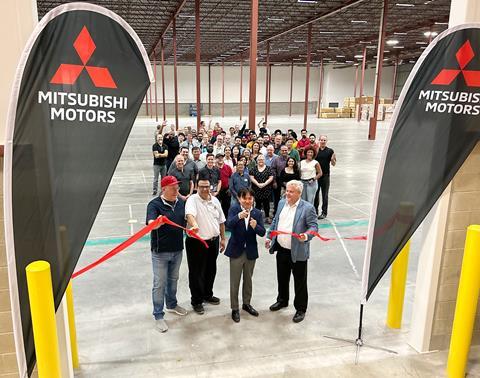
However, alongside these profit-protecting reasons is the basic fact that any new model launch, whether combustion-engine or electric vehicle, is a big deal for parts storage and makes demands on available capacity. Regardless of powertrains, those new cars still need spare doors, bonnets and bumpers (and tyres), and they are the items that take up space in a warehouse. Mitsubishi Motor Sales now has that space for the foreseeable future and has the flexibility to rack the additional 6,200 sq.m as required. The expanded PDC now stocks 17,500 line items and the daily average throughput is 1,500 parts.
“The space will evolve over the course of the next ten years and it has given us flexibility, so [the expansion] has served multiple purposes – immediate and more longer-term ones,” said McGrath.
While determining space for parts maybe an agnostic practice when it comes to powertrain, the expansion of the PDC will have to accommodate an increasing number of parts for EVs, notably the batteries themselves, as the Canadian automotive industry moves towards its mandate to be all-electric by 2035.
“Obviously we will be transitioning toward that as the requirements tighten up over that time,” said McGrath. “Right now, our units in operation do not contain a huge percentage of those with EV batteries, though it is growing every year, especially with the success of the Outlander plug-in hybrid.”
Mitsubishi Motors North America sold almost 6,700 Outlander plug-in hybrid vehicles (Phevs) in 2023, an increase of 240.7% over 2022. That model is imported from Japan.
“The space [at Mississauga] will evolve over the course of the next ten years and it has given us flexibility, so [the expansion] has served multiple purposes – immediate and more longer-term ones” – Brian McGrath, MMSCAN
Supporting Mitsubishi’s nationwide dealers
Distributing service parts from the PDC in Mississauga across Canada has its challenges given the distances across the provinces. Mitsubishi’s home Japan can fit into Canada 29 times but has three times the population. In Canada, the majority of the population is located within a 200km of the border with the US and Mitsubishi Motor Sales can guarantee next day delivery of service parts to those more populated centres.
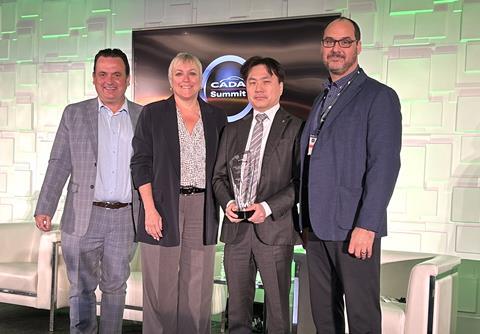
“The province with the most dealers is Quebec, followed by Ontario, and I would say somewhere in the region of 60 of our 97 dealers are in that geographic area,” said McGrath. “A good two-thirds of our network is in a fairly tight area, so the logic of having our PDC where it is makes sense.
However, it also has some dealers in northern Quebec and northern Alberta, and even as far as Newfoundland. Reaching those dealers can take five to seven days and both the dealers and the PDC in Mississauga have to work together to manage inventory accordingly, ensuing the more remote dealers have enough months of supply on the shelf. The same is true of deliveries to the west coast of Canada but high customer satisfaction index (CSI) scores indicate dealers in both regions are doing a good job, according to McGrath.
Given the room Mitsubishi now has to expand in Mississauga there are currently no plans for another PDC in western Canada, though the company was exploring a shared facility in Calgary with its group partner Nissan a few years ago. While that project did not come to fruition Mitsubishi is keeping its options open for similar future projects.
“We learned that it might not have a huge impact on the bottom line but it is very important for us from a customer satisfaction standpoint that we maintain or grow on the success we have had,” said McGrath. “We are putting in more facilities to deal with that, in much the same way we did in expanding our current PDC.”
Going the distance
To move the parts out to its dealers MMSCAN is working with a number of transport providers, including FedEx, Just Rush, Manitoulin, Morneau and Purolator. The terms of contract with those partners are governed by the distances covered.
“For the ones that travel the bigger distances we do tend to lock them in, including Groupe Morneau and Manitoulin Transport for example,” said McGrath. Purolator and Just Rush provide more regionalised services in Ontario and Quebec, but they are all integral on getting parts to dealers across the geographies they cover in the specified time. “The long-range contracts are more robust so we have the degree of predictability we need to cover those massive distances.”
Those transport providers are also managing parts returns, one of Mitsubishi Motor Sales’ dealer support programmes that had to be suspended because of a lack of space in the existing facility, but which is now back up and running thanks to the extension. Its Dealer Obsolescence Program was resumed in November last year following the opening of the PDC extension. That programme allows dealers to send back unsold parts for a credit, meaning fewer parts have to go to landfill in local communities.
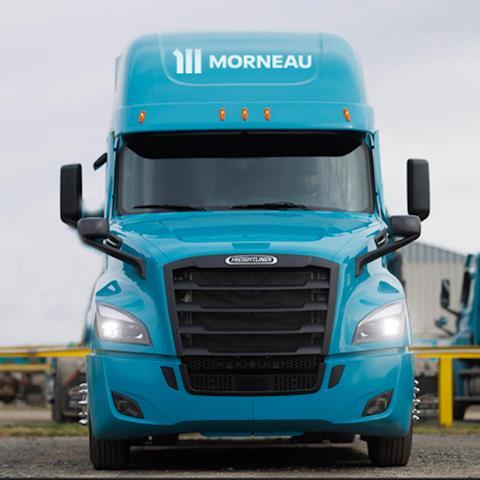
Mitsubishi had run out of the space required to process returns as its dealership network in Canada grew and turned to sending field staff out to inspect the parts onsite at the dealers. That process was complicated by Covid and the company was forced to resort to “an honour system on scrapping”, says McGrath.
Now it has an abundance of space at its disposal again Mitsubishi is bringing parts back to the PDC, though not all of them.
“All we ask for back are parts that are on the obsolescence list that we have an interest in,” says McGrath. “We don’t think that shipping items back that are going to be scrapped is good environmental stewardship, using gas and transport to just dump the part when it gets back.”
Instead, the strategy is to scrap those unneeded parts on site at the dealer and only send back the ones it can use.
Transparent inventory
One of the other services Mitsubishi Motor Sales in Canada we will be introducing in April this year to support its dealer network is a platform provided by technology provider Royal 4 Systems, to provide greater visibility on available service parts inventory. The system will allow dealers to see what is available on the shelf at any other dealer and enable them to make an informed choice on getting the required part to the end user more quickly, for example from a dealership that is closer, rather than shipping from the PDC.
“All we ask for back are parts that are on the obsolescence list that we have an interest in/ We don’t think that shipping items back that are going to be scrapped is good environmental stewardship” – Brian McGrath, MMSCAN
The platform also gives a dealer the opportunity to list parts they want to dispose of that may be in demand elsewhere.
“We felt, especially during Covid, it was infuriating when all the parts were being scrapped on site while we were waiting on long lead times for something to come in to the PDC. They could have had it at the store but had scrapped it.
Tailored warehouse management
Royal 4 Systems is not just providing the visibility platform for Mitsubishi’s dealers in Canada, it is providing comprehensive systems to cover operations in the Mississauga PDC. The expansion at the Mississauga site included the growth of the existing warehouse management system (WMS) and the extension of the ten-year relationship Mitsubishi Motor Sales has maintained with Royal 4 Systems to run operations there.
Royal 4 Systems, based in Long Beach, was already well-established technology provider for inventory management but Mitsubishi was its first contract with a carmaker.
“At the end of the day it is still warehousing but there are nuances of the automotive aftersales business they had to work with, so we partnered with them,” says McGrath. “They had a good product, it just needed to be positioned right for us and we have worked with them over the years to make this system work the way it does today.”
McGrath says the system works perfectly in concert with Mitsubishi’s own processes because it has a more bespoke, tailored end-product that has been adjusted along the way and as a result is more efficient and reliable than its previous system. That is also relies on the comprehensive adoption of the technology Mitsubishi has made.

“We don’t use a module from another company and try to connect it to this one, we try to make sure we have all of their peripheral items that are designed to work with their system,” says McGrath.
That includes modules for parts return or for ETAs, or modules for dealer inventory visibility (as outlined above).
“We use what they have built so it works well and there is no compromise. Over time we have found that strategy has helped us,” says McGrath.
All of our the parts in the Mississauga PDC are barcoded and the operatives who are involved with the picking, packing and shipping process carry a barcode reader. The individual orders that they are working on are all communicated to that barcode scanner. As they scan the order it is fulfilled in the system which automatically adjusts the PDC inventory in real time.
“I’m not sure you could call it Star Trek or anything like that, but you would be surprised how many manufacturers use archaic systems that rely on a lot of number crunching and spreadsheets to figure out where they actually stand at the end of the day,” notes McGrath. “I feel that we have a pretty solid number at the end of the day, but you can go look at it at any time and see a live situation that shows what your inventory value truly is.”
Currently, Mitsubishi is not using any automation of tasks at the Canadian PDC, though the company does use it in other locations, such as its PDC in Nagoya, Japan. McGrath says efficiency levels are high and there are no immediate plans for automation, but adds that as parts for new models are accommodated the company will review processes. He considers the additional space at Mississauga as a blank canvass on which to evolve aftermarket services.
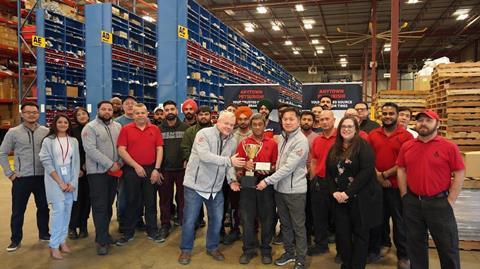
Familiar faces
The marriage of Royal 4 System’s technology with Mitsubishi’s aftersales processes in a more efficient and user-friendly system also has benefits for staff retention and attraction, something of importance to an industry suffering from high turnover and recruitment problems since Covid.
It is also very easy to teach, according to McGrath, which means with new recruits the time taken to train them is significantly reduced compared to the way it used to be.
“There are efficiencies beyond the picking, packing and shipping of parts,” he says. “It is something that we can’t imagine not having. It has been a great evolution in the way we do business.”
McGrath also acknowledges that the frustration of working with a system that is flawed impacts staff turnover.
“It is not fun to use an antiquated system that doesn’t cooperate well,” he observes. “[By contrast] we have really good consistency in our material handlers and warehouse staff, the same faces have been there for over a decade in many cases, and it’s a tight operation.”

























![Global[1]](https://d3n5uof8vony13.cloudfront.net/Pictures/web/a/d/s/global1_726550.svgz)




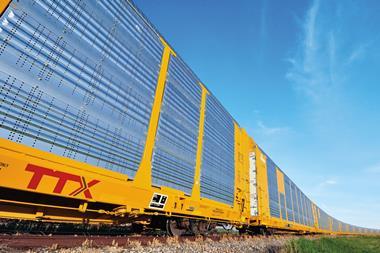








No comments yet